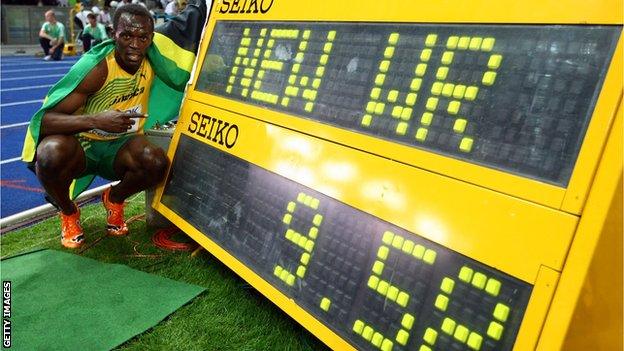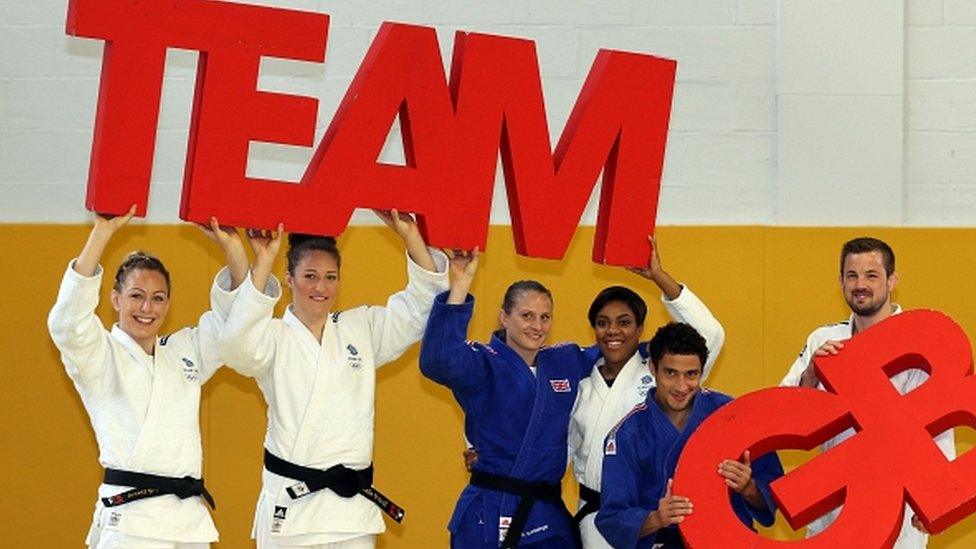Rio 2016: How the 100m record has got faster over time
- Published

Usain Bolt holds the 100m men's world record time of 9.58 seconds
Olympic Games on the BBC |
|---|
Hosts: Rio de Janeiro Dates: 5-21 August Rio time: BST -4 |
Coverage: Watch on BBC One, BBC Two, BBC Four, Red Button and up to 24 HD video streams on mobile, desktop, connected TVs and app, plus follow on Radio 5 live and via live text commentary. |
The 100m is arguably the Olympic Games' most iconic event.
A gold medal in the race gives an athlete global recognition. Breaking the world record over the distance ensures sporting immortality.
American Donald Lippincott and Czech Marie Mejzlikova were the first, with Jamaica's Usain Bolt and Florence Griffith-Joyner of the United States the current holders of the crown.
Before the 2016 Games in Rio, at which Bolt and compatriot Shelly-Ann Fraser-Pryce will defend the 100m titles they won in London four years ago, BBC Sport presents a chronological history of world records in the event, showing each time it has been broken and when.
Year | Gender | Name | Country | Time | Interesting Facts |
2009 | Men | Usain Bolt | Jamaica | 9.58 | Continuing Jamaica's 100m dominance, two-time Olympic 100m gold medallist Bolt breaks the record twice in 2008 (including in the Beijing Olympic final) before clocking the fastest ever time in the World Championships final in Berlin. |
2008 | Men | Usain Bolt | Jamaica | 9.69 | |
2008 | Men | Usain Bolt | Jamaica | 9.72 | |
2007 | Men | Asafa Powell | Jamaica | 9.74 | |
2005 | Men | Asafa Powell | Jamaica | 9.77 | From 2005 until 2007, Powell dominates, clocking and then twice equalling a new record time before overcoming injury problems to improve it slightly at the IAAF Grand Prix in Rieti, Italy. |
1999 | Men | Maurice Greene | United States | 9.79 | |
1996 | Men | Donovan Bailey | Canada | 9.84 | |
1994 | Men | Leroy Burrell | United States | 9.85 | |
1991 | Men | Carl Lewis | United States | 9.86 | |
1991 | Men | Leroy Burrell | United States | 9.90 | |
1988 | Men | Carl Lewis | United States | 9.92 | |
1988 | In the men's 100m in Seoul - the most controversial race in athletics history - Canadian Ben Johnson has his gold medal-winning world record time of 9.79 rescinded after he fails a drug test. | ||||
1980s | Great Britain won Olympic 100m gold twice in 12 years, courtesy of Allan Wells and Linford Christie. Wells won in Moscow 1980 in a time of 10.25s before Christie triumphed in Barcelona when he clocked 9.96s. | ||||
1988 | Women | Florence Griffith Joyner | United States | 10.49 | Los Angeles-born Griffith Joyner knocks almost half a second off her pre-1988 best to set a new record at the US Olympic trials before going on to win gold at the Seoul Games. It remains the fastest ever by a female athlete. |
1984 | Women | Evelyn Ashford | United States | 10.76 | |
1983 | Men | Calvin Smith | United States | 9.93 | |
1983 | Women | Evelyn Ashford | United States | 10.79 | |
1983 | Women | Marlies Gohr | East Germany | 10.81 | |
1977 | Women | Marlies Gohr | East Germany | 10.88 | |
1977 | The IAAF decrees that all times must be recorded using fully automatic timing to the hundredth of a second | ||||
1976 | Women | Annegret Richter | West Germany | 11.01 | |
1976 | Women | Inge Helten | West Germany | 11.04 | |
1972 | Women | Renate Stecher | East Germany | 11.07 | |
1968 | Men | Jim Hines | United States | 9.95 | American Hines is the first to go under the 10-second barrier during the USA Track and Field Championships in Sacramento. In a meeting dubbed 'The Night of Speed', Hines' time is equalled by Ronnie Ray Smith and Charles Greene. |
1968 | Men | Jim Hines | United States | 9.9 | |
1968 | Women | Wyomia Tyus | United States | 11.08 | |
1968 | The Mexico City Olympics are the first global track and field event to be held on a firm synthetic surface. | ||||
1965 | Women | Irena Szewinska | Poland | 11.1 | |
1961 | Women | Wilma Rudolph | United States | 11.2 | A year after becoming the first American woman athlete to win three track and field golds at one Olympics, Rudolph breaks the world record in Stuttgart. |
1960 | Men | Armin Hary | West Germany | 10.0 | |
1956 | Men | Willie Williams | United States | 10.1 | |
1955 | Women | Shirley Strickland | Australia | 11.3 | |
1952 | Women | Marjorie Nelson | Australia | 11.4 | |
1948 | Women | Fanny Blankers-Koen | Netherlands | 11.5 | |
1948 | Starting blocks and wind gauges are first used at an Olympic Games, in London. | ||||
1937 | Women | Stanislawa Walasiewicz | Poland | 11.6 | |
1936 | Men | Jesse Owens | United States | 10.2 | American Owens breaks the record in Chicago in June. Two months later he won four gold medals - including in the 100m - at the Berlin Olympics amid Nazi propaganda promoting 'Aryan superiority'. |
1934 | Women | Stanislawa Walasiewicz | Poland | 11.7 | |
1933 | Women | Stanislawa Walasiewicz | Poland | 11.8 | |
1932 | Women | Tollien Schuurman | Netherlands | 11.9 | |
1930 | Men | Percy Williams | Canada | 10.3 | |
1928 | Women | Myrtle Cook | Canada | 12.0 | |
1928 | Women | Kinue Hitomi | Japan | 12.2 | |
1926 | Women | Gundel Wittman | Germany | 12.4 | |
1922 | Women | Mary Lines | Great Britain | 12.8 | |
1922 | Women | Marie Mejzlikova II | Czechoslovakia | 13.6 | The first recorded women's world record time is that set by Mejzlikova in Prague in her native Czechoslovakia. |
1921 | Men | Charles Paddock | United States | 10.4 | |
1912 | Men | Donald Lippincott | United States | 10.6 | The IAAF starts identifying world records in 1912, with American Lippincott recording the first in his heat at the Olympics in Stockholm. He won bronze in the final. |
Subscribe to the BBC Sport newsletter, external to get our pick of news, features and video sent to your inbox.
- Published18 August 2016

- Published3 August 2016

- Published19 July 2016

- Published3 August 2016
